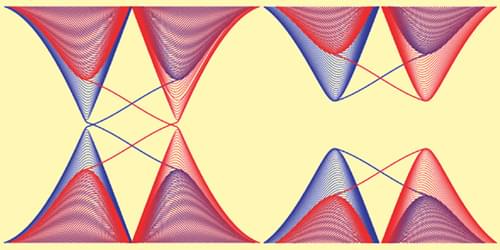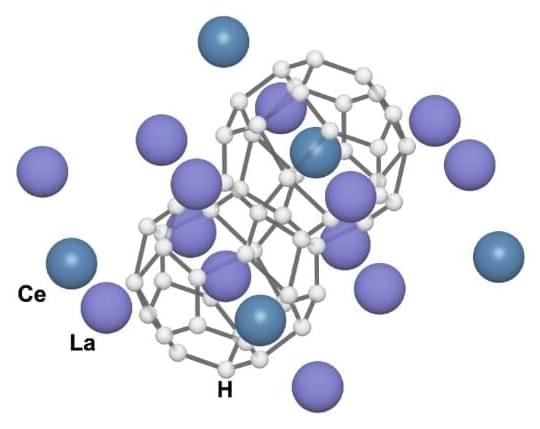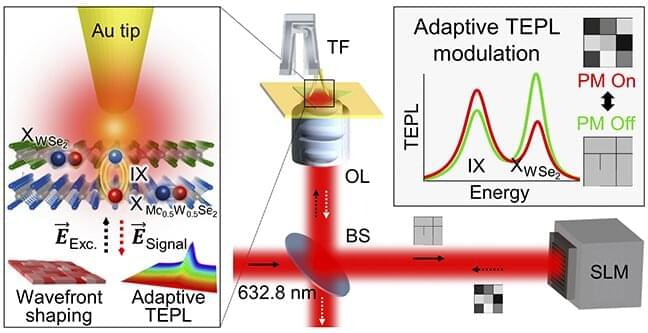Archive for the ‘computing’ category: Page 239
May 15, 2023
Quantum Entanglement Shatters Einstein’s Local Causality: The Future of Computing and Cryptography
Posted by Paul Battista in categories: computing, encryption, quantum physics
ETH Zurich researchers have succeeded in demonstrating that quantum mechanical objects that are far apart can be much more strongly correlated with each other than is possible in conventional systems. For this experiment, they used superconducting circuits for the first time.
May 15, 2023
New Quantum Computer Algorithm Unlocks the Power of Atomic-Level Interactions
Posted by Paul Battista in categories: chemistry, computing, information science, quantum physics
A novel protocol for quantum computers could reproduce the complex dynamics of quantum materials.
RIKEN researchers have created a hybrid quantum-computational algorithm that can efficiently calculate atomic-level interactions in complex materials. This innovation enables the use of smaller quantum computers or conventional ones to study condensed-matter physics and quantum chemistry, paving the way for new discoveries in these fields.
A quantum-computational algorithm that could be used to efficiently and accurately calculate atomic-level interactions in complex materials has been developed by RIKEN researchers. It has the potential to bring an unprecedented level of understanding to condensed-matter physics and quantum chemistry—an application of quantum computers first proposed by the brilliant physicist Richard Feynman in 1981.
May 15, 2023
Quantum Computers Could Be a ‘Superhighway’ to Experiencing Our Other Selves in the Multiverse
Posted by Shailesh Prasad in categories: computing, cosmology, quantum physics

It could be a strange way of achieving immortality—or at least, everlasting life for copies of you.
May 14, 2023
Quantum Spin Hall Effect Seen in Graphene Analog
Posted by Saúl Morales Rodriguéz in categories: computing, quantum physics
Graphene’s valence and conduction bands meet at a point, making the single-layer crystal a semimetal. Researchers have predicted that spin-orbit coupling of carbon’s outer electrons opens a narrow gap between these bands—but only for the crystal’s bulk. Along the edges, spin-dependent states bridge the band gap, allowing the resistance-free flow of electrons: a quantum spin Hall effect. The weakness of carbon’s spin-orbit coupling means that this quantum spin Hall effect is too fragile to observe, however. Now Pantelis Bampoulis of the University of Twente in the Netherlands and his collaborators have seen the quantum spin Hall effect in graphene’s germanium (Ge) analog, germanene [1]. Furthermore, they show that germanene’s structure—a honeycomb like graphene’s, but lightly buckled—allows the quantum spin Hall effect to be turned off and on using an electric field.
Bampoulis and his collaborators grew a germanene monolayer on a buffer layer of Ge atop a substrate of Ge2Pt. Using a scanning tunneling microscope, they discriminated between the edge and the bulk states of germanene and measured how current depended on voltage under an external electric field perpendicular to the layer. At low field strengths, germanene exhibited a robust quantum spin Hall effect due to germanium’s strong spin-orbit coupling. At high field strengths, the edge states no longer bridged the gap and germanene became a normal insulator. But at a critical intermediate value, germanene underwent a topological phase transition as the otherwise separated conduction and valence bands in the bulk came together and the symmetry that sustained the quantum spin Hall effect was destroyed.
The robustness of germanene’s quantum spin Hall effect and the fact that it can be turned off with an applied electric field suggest that the material could be used to make room-temperature topological field-effect transistors.
May 14, 2023
New material facilitates search for room-temperature superconductivity
Posted by Saúl Morales Rodriguéz in categories: computing, engineering, nuclear energy, physics, transportation
Scientists from Jilin University, the Center for High Pressure Science and Technology Advanced Research, and Skoltech have synthesized lanthanum-cerium polyhydride, a material that promises to facilitate studies of near-room-temperature superconductivity. It offers a compromise between the polyhydrides of lanthanum and cerium in terms of how much cooling and pressure it requires. This enables easier experiments, which might one day lead scientists to compounds that conduct electricity with zero resistance at ambient conditions—an engineering dream many years in the making. The study was published in Nature Communications.
One of the most intriguing unsolved questions in modern physics is: Can we make a material that conducts electricity with zero resistance (superconducts) at room temperature and atmospheric pressure? Such a superconductor would enable power grids with unprecedented efficiency, ultrafast microchips, and electromagnets so powerful they could levitate trains or control fusion reactors.
In their search, scientists are probing multiple classes of materials, slowly nudging up the temperature they superconduct at and decreasing the pressure they require to remain stable. One such group of materials is polyhydrides—compounds with extremely high hydrogen content. At −23°C, the current champion for high-temperature superconductivity is a lanthanum polyhydride with the formula LaH10. The trade-off: It requires the pressure of 1.5 million atmospheres. At the opposite end of the spectrum, cuprates are a class of materials that superconduct under normal atmospheric pressure but require cooler temperatures —no more than −140°.
May 14, 2023
Astronomers just saw a star eat a planet—an astrophysicist on the team explains the first-of-its-kind discovery
Posted by Shubham Ghosh Roy in categories: computing, space

For the first time, astronomers have captured images that show a star consuming one of its planets. The star, named ZTF SLRN-2020, is located in the Milky Way galaxy, in the constellation Aquila. As the star swallowed its planet, the star brightened to 100 times its normal level, allowing the 26-person team of astronomers I worked with to detect this event as it happened.
I am a theoretical astrophysicist, and I developed the computer models that our team uses to interpret the data we collect from telescopes. Although we only see the effects on the star, not the planet directly, our team is confident that the event we witnessed was a star swallowing its planet. Witnessing such an event for the first time has confirmed the long-standing assumption that stars swallow their planets and has illuminated how this fascinating process plays out.
May 14, 2023
Team develops the world’s smallest and fastest nano-excitonic transistor
Posted by Quinn Sena in categories: computing, nanotechnology, quantum physics
How can Marvel movie character Ant-Man produce such strong energy out of his small body? The secret lies in the transistors on his suit that amplify weak signals for processing. Transistors that amplify electrical signals in the conventional way lose heat energy and limit the speed of signal transfer, which degrades performance. What if it were possible to overcome such limitations and make a high-performance suit that is light and small but without the loss of heat energy?
A POSTECH team of Professor Kyoung-Duck Park and Yeonjeong Koo from the Department of Physics and a team from ITMO University in Russia led by Professor Vasily Kravtsov jointly developed a nano-excitonic transistor using intralayer and interlayer excitons in heterostructure-based semiconductors, which addresses the limitations of existing transistors. The research was recently published in the journal ACS Nano.
Excitons are responsible for light emission of semiconductor materials and are key to developing a next-generation light-emitting element with less heat generation and a light source for quantum information technology due to the free conversion between light and material in their electrically neutral states.
May 14, 2023
The 5 most significant breakthroughs in quantum computing
Posted by Shailesh Prasad in categories: computing, quantum physics

Ragsxl/Wikimedia Commons.
Unlike classical computers, which operate on binary bits (0 and 1), quantum computers operate on quantum bits or qubits. Qubits can exist in a state of superposition. This means that any qubit has some probability of existing simultaneously in the 0 and 1 states, exponentially increasing the computational power of quantum computers.
May 14, 2023
This Company Is Using Enzymatic DNA Synthesis To Usher In The Next Generation Of Synthetic Biology Innovation
Posted by Genevieve Klien in categories: bioengineering, biotech/medical, chemistry, computing, food
DNA writing is an aspect of our industry that I’ve been closely watching for several years because it is a critical component of so many groundbreaking capabilities, from cell and gene therapies to DNA data storage. At the SynBioBeta Conference in 2018, the co-founder of a new startup that was barely more than an idea gave a lightning talk on enzymatic DNA synthesis — and I was so struck by the technology the company was aiming to develop that I listed them as one of four synthetic biology startups to watch in 2019. I watched them, and I wasn’t disappointed.
Ansa Biotechnologies, Inc. — the Emeryville, California-based DNA synthesis startup using enzymes instead of chemicals to write DNA — announced in March the successful de novo synthesis of a 1005-mer, the world’s longest synthetic oligonucleotide, encoding a key part of the AAV vector used for developing gene therapies. And that’s just the beginning. Co-founder Dan Lin-Arlow will be giving another lightning talk at this year’s SynBioBeta Conference in just a few weeks. I caught up with him in the lead up and was truly impressed by what Ansa Biotechnologies has accomplished in just 5 years.
Synthetic DNA is a key enabling technology for engineering biology. For nearly 40 years, synthetic DNA has been produced using phosphoramidite chemistry, which facilitates the sequential addition of new bases to a DNA chain in a simple cyclic reaction. While this process is incredibly efficient and has supported countless innovative breakthroughs (a visit to Twist Bioscience’s website will quickly educate you on exciting advances in drug discovery, infectious disease research, cancer therapeutics, and even agriculture enabled by synthetic DNA) it suffers from two main drawbacks: its reliance on harsh chemicals and its inability to produce long (read: complex) DNA fragments.














